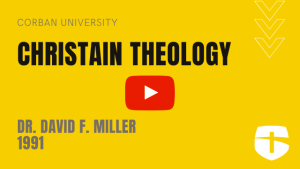
Christian Theology
by Dr.
Product details
- Microsoft Word : 160 pages
- 33 Video Lectures: Each about 45 min long
- Product Dimensions : 8.5 x 11 inches
- Location: Corban University, Salem, OR
- Filming Date: School Year 1991
- Publisher : Corban University (November 14, 2020)
Series 1
Lecture 2: Scripture and the sources of theology
Lecture 3: What is the right opinion? Orthodoxy – what is it and how was it threatened.
Lecture 4: An overview of liberalism, fundamentalism and more recently new evangelicalism is presented.
Series 2
Lecture 6: Origination of Scripture and the Revelation of Scripture
Lecture 7: Progressive Revelation - When the writers of Scripture received the revelation from God, they did not get it all at one time.
Lecture 8: Permanency of Revelation -- The New Testament (the words of Jesus and His official representatives) is complete.
Lecture 9: Do the 66 books of the Bible belong in the bible?
Series 3
Lecture 11: Inerrancy of Scripture - #dalmatiantheology
Lecture 13: Interpretation of Scripture
Lecture 14: Proper Analysis of Scripture -- Inerrancy of Scripture
Proper Analysis of Scripture/Inerrancy of Scripture
- Taking scripture out of context (praying scripture not intended as a prayer)-new (current) attack on the church
- What does scripture mean to you?-bad theology, should be “what does scripture mean” period.
- Historical analysis-history/background of passage
- Grammatical analysis
- Literary analysis
- Quotes- “Can you prove anything from the Bible?”-NO
- “Believe with all your heart”-not a pump (physical heart) but the innermost being.
Lecture 15: Interpreting scripture through Systems of Theology - Dispensational Theology and Covenant Theology
Lecture 16: Textual Criticism. Using the nursery rhyme, “Hickory Dickory Dock”
Series 4
Lecture 18: Methods Used in Translating Different Versions of the Bible
Series 5
Lecture 25: The Spiritual Gift of Pastoring
Lecture 26: The Attributes of God
Lecture 27: God Rendered Certain All Events
God Rendered Certain All Events
A difficult topic to both discuss and fully grasp or understand
“Sovereign” – God has rendered certain all things that have come to pass
“All we are is little rebels who rebelled against God, but apart from God’s grace he changed our lives and made us look at things differently.”
Series 6
Lecture 29: What is the "the perfect" in 1 Corinthian 13:9?
Lecture 30: How do we interpret signs and wonder/ speaking in tongues?
How do we interpret signs and wonder/ speaking in tongues? Mark 16, word study. Does Mark 16 threaten our beliefs? The signs and wonders that Jesus says will follow “you” were directed at the apostles, not us. Moves then to Acts 8. Speaking in tongues was them speaking in different dialects, but when the apostles got there. Acts 11.
A word study on tongues
Lecture 31: Understanding speaking in tongues/miracles
2 passages key to understanding speaking in tongues/miracles. Deut 28 and Isaiah 28. “It’s impossible to explain everyone’s experience.” Miracles on TV. “It’s easy to be deceived.” This would be a good title for this video.
“Look to the Bible first, that’s how you develop your theology, not to your experience.”
Lecture 32: Are believers always indwelt by the Holy Spirit?
Big question: Are believers always indwelt by the Holy Spirit? Are believers always controlled by the Holy Spirit?
Romans Ch 8. Contrast between two things: spirit vs flesh. Life vs death. Are these contrasting between believers, or between believers and nonbelievers. Word study. Contrasting between believers and nonbelievers.
Found no classic zingers, or quotes.
Lecture 33: What is the revealed Will of God?
- “Theme and lesson is “making wise choices” 1 thess 3
- What is the revealed Will of God? How Paul determined what he should and should not do. .” Paul’s Mindset was, ‘in light of all the options, what is the best thing to do’.
- “you can’t know 100% certainty (the will of God) “we have freedom, you can do whatever you want. However, remember we need to exercise our freedom in a responsible way.”
Lecture 34: Will of God continued
Decisions about marriage and decisions within the church, plus any other questions the students bring up. Does God have a specific will for our lives in areas not explicitly talked about in scripture?
Job 33:15. God can speak to you, or give you a feeling, or speak to you in a dream. But in light of your experiences, you have to weigh them or bring them into balance. You need to figure out what God is really telling you and what is the best decision.



